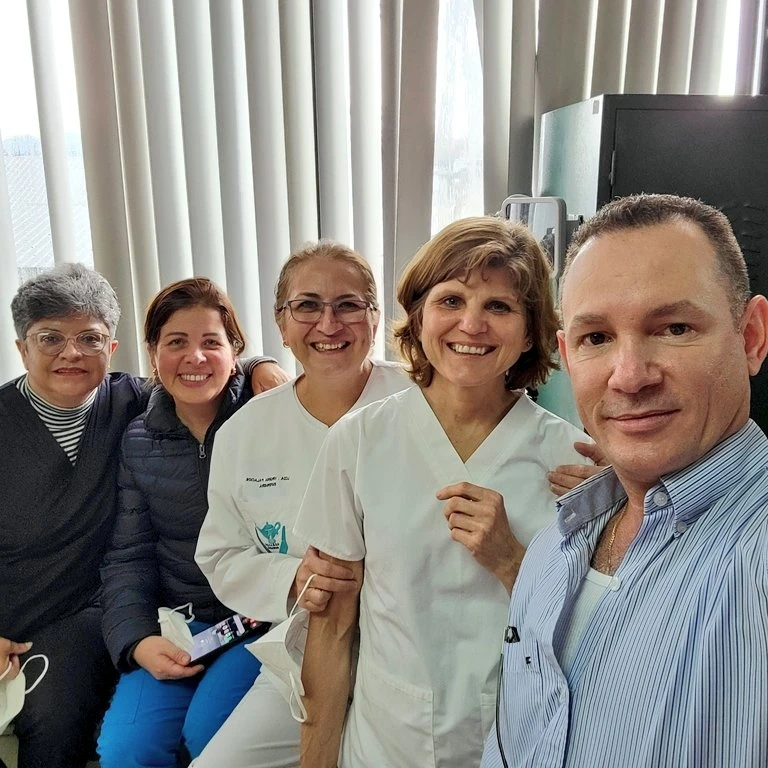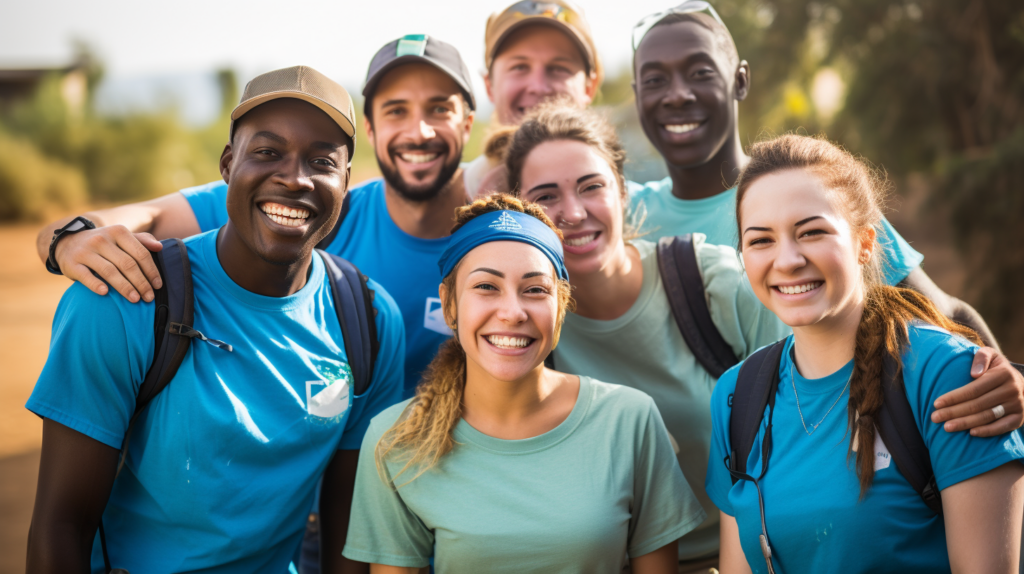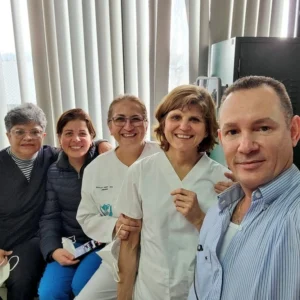Hey there! Are you ready to embark on a journey of personal growth and cultural immersion? Volunteering abroad can be an incredibly rewarding experience that allows you to make a positive impact while gaining new perspectives and skills. In this article, we’ll explore the concept of cultural immersion through volunteering and its many benefits. So let’s dive right in!
Are you curious to understand what cultural immersion truly means? Do you want to know how volunteering can help you expand your horizons and develop as an individual? We’ll cover all of this and more! Additionally, we’ll guide you through the process of choosing the right volunteer program and preparing for your cultural immersion journey. We’ll also discuss the importance of embracing cultural differences and engaging with the local community. Finally, we’ll reflect on the personal growth you can expect from this experience.
Ready to learn more about enhancing personal growth through cultural immersion? Let’s get started by understanding what cultural immersion is and why it’s so valuable.

Understanding Cultural Immersion
Definition and Importance
Cultural immersion refers to the process of fully engaging and participating in the culture of a particular community or country. It involves experiencing the daily life, traditions, customs, and values of the local people. Cultural immersion allows individuals to gain a deep understanding and appreciation of different cultures, fostering personal growth and development.
Cultural immersion is important because it helps break down cultural barriers, promotes mutual understanding, and cultivates empathy. It allows individuals to step out of their comfort zones, challenge their preconceived notions, and expand their perspectives. By immersing themselves in a different culture, individuals can gain a deeper appreciation for diversity and learn to navigate and adapt to unfamiliar situations.
Benefits of Cultural Immersion through Volunteering
Volunteering is a powerful way to engage in cultural immersion. When you combine volunteering with cultural immersion, you can experience firsthand the joys and challenges of the local community. Here are some key benefits of cultural immersion through volunteering:
- Broadens Your Horizon: Volunteering in a different cultural context exposes you to new ideas, perspectives, and ways of life. It expands your knowledge and understanding of the world.
- Builds Cultural Competence: Through volunteering, you interact with local people, which helps you develop cultural sensitivity and communication skills. This competence is valuable in an increasingly globalized world.
- Creates Meaningful Connections: Volunteering often involves working closely with locals, fostering deep connections and friendships. These connections can have a lasting impact on your personal and professional life.
- Supports Sustainable Development: When you engage in volunteer work that aligns with local community needs, you contribute to the long-term development and well-being of the community.
- Enhances Personal Growth: Cultural immersion through volunteering pushes you outside your comfort zone and challenges you to learn and grow. It builds resilience, adaptability, and self-confidence.
- Leads to Cross-cultural Understanding: By immersing yourself in a different culture, you gain a deeper understanding and appreciation for diversity. This understanding fosters acceptance and promotes peace.
So, if you’re looking for personal growth and a unique way to explore different cultures, cultural immersion through volunteering can be a transformative experience. In the next section, we’ll discuss how to choose the right volunteer program that aligns with your interests and values.
Choosing the Right Volunteer Program
When it comes to cultural immersion through volunteering, choosing the right program is crucial. It will determine the impact you can make, the experiences you’ll have, and the personal growth you’ll achieve. Here are some key factors to consider when selecting the perfect volunteer program:
Researching Various Volunteer Opportunities
Before committing to a volunteer program, take the time to research different opportunities available. Look into organizations that align with your interests and values. Consider the types of projects they offer and the locations where they operate. Reading reviews and testimonials from past volunteers can give you valuable insights into the organization’s reputation and the quality of their programs.
Matching Your Skills and Interests
To make the most out of your volunteer experience, it’s important to match your skills and interests with the project you choose. Whether you’re passionate about education, healthcare, environmental conservation, or community development, there’s a volunteer program out there that needs your unique abilities. This alignment will not only make your contributions more valuable but also provide you with a meaningful and fulfilling experience.
Ensuring Ethical and Sustainable Practices
When volunteering abroad, it’s essential to ensure that the program you choose follows ethical and sustainable practices. Look for organizations that prioritize the well-being of the local community and environment. Consider if they involve local community members in decision-making processes and if they have long-term goals for sustainable development. By supporting ethical programs, you can be confident that your efforts are making a positive impact.
To help you make an informed decision, here are some questions you can ask when evaluating volunteer programs:
- How do they involve and empower the local community?
- What measures do they have in place to ensure the sustainability of their projects?
- Do they provide pre-departure training and support for volunteers?
- What are the safety and security protocols in place?
Taking the time to choose the right volunteer program will greatly enhance your cultural immersion experience and allow you to make a lasting impact. So take the time to research, match your skills and interests, and ensure ethical and sustainable practices. Your journey of personal growth and cultural immersion awaits!
“The best way to find yourself is to lose yourself in the service of others.” – Mahatma Gandhi
Preparing for Cultural Immersion
Preparing for cultural immersion is a crucial step before embarking on a volunteering experience in a different country or community. It involves understanding the local culture, practicing cultural sensitivity, and preparing yourself for effective communication. Here are some essential tips to help you make the most of your cultural immersion journey:
Learning about the Local Culture
Before you travel to a new destination, take the time to learn about the local culture. Researching the customs, traditions, and beliefs of the community you will be immersing yourself in will help you navigate the environment more smoothly. Here are some ways to learn about the local culture:
- Read books, articles, or travel guides about the country to gain insights into its history, traditions, and values.
- Watch documentaries or movies that depict the local culture.
- Seek out authentic experiences, such as trying local cuisine or attending cultural events in your own city.
Understanding Cultural Sensitivity and Etiquette
Cultural sensitivity is crucial for avoiding misunderstandings and showing respect to the local community. Here are some tips to help you navigate cultural differences with sensitivity:
- Familiarize yourself with the local customs and etiquette. For example, in some cultures, it’s customary to remove your shoes before entering a home or place of worship.
- Be mindful of your body language and gestures, as they may have different meanings in different cultures.
- Respect local dress codes and norms. Dress modestly if required and adapt your clothing choices to match the local standards.
Language Preparation and Communication
Communication plays a vital role in cultural immersion. Learning a few basic phrases in the local language can go a long way in building connections and showing respect. Here are some tips for language preparation:
- Learn common greetings, thank-you phrases, and basic conversational phrases in the local language.
- Practice pronunciation and ask locals for guidance in improving your language skills.
- Be patient and open-minded when communicating, as there may be language barriers that require alternative forms of communication, such as gestures or using translation apps.
By preparing yourself with knowledge about the local culture, practicing cultural sensitivity, and proactively learning the local language, you can enhance your cultural immersion experience. These preparations will not only help you navigate the new environment, but they will also enable you to connect more deeply with the local community and gain a richer understanding of their way of life.
“Preparing for cultural immersion is like learning the language of a new land that you are about to explore. It opens doors, creates connections, and enriches your overall experience.”
Embracing Cultural Differences
When embarking on a cultural immersion experience through volunteering, one of the most important aspects is embracing and appreciating cultural differences. This mindset not only allows you to have a more fulfilling and enriching experience but also fosters personal growth and understanding. Here are some key ways to embrace cultural differences during your volunteering journey:
Respecting Local Customs and Traditions
One of the first steps in embracing cultural differences is to show respect for the customs and traditions of the local community you are working with. Take the time to learn about their practices and beliefs, and try to understand the significance behind them. By respecting and honoring their traditions, you show that you value their culture and create a welcoming environment for yourself.
Adapting to New Environments
Volunteering often involves working in unfamiliar settings and adapting to new environments. This could mean adjusting to different living conditions, food, climate, or social norms. Embracing cultural differences means being open-minded and flexible in these new situations. Embrace the challenges and embrace the beauty of diversity that comes with experiencing different ways of life.
Challenging and Expanding your Perspectives
When immersing yourself in a new culture, you have the opportunity to challenge and expand your perspectives. Engage in conversations with locals, listen to their stories, and learn from their experiences. This allows you to gain fresh insights into the world, broaden your understanding, and break free from any preconceived notions.
“The world is a book, and those who do not travel read only one page.” – Saint Augustine
Seek out new experiences and be willing to step outside of your comfort zone. This could involve trying new foods, participating in local festivals or rituals, or learning traditional dances or crafts. Embracing cultural differences means fully immersing yourself in the local way of life and actively engaging with the community.
By embracing cultural differences, you will not only deepen your connection with the local community but also foster a greater sense of empathy, respect, and understanding. This personal growth extends beyond your volunteer experience and has a lasting impact in all aspects of your life.
So, when embarking on your cultural immersion journey, remember to embrace cultural differences, be open-minded, and cherish the diversity that makes our world beautiful.
Engaging with the Local Community
When embarking on a cultural immersion journey through volunteering, one of the most fulfilling aspects is engaging with the local community. This is an opportunity to connect with individuals, learn from their experiences, and contribute to their well-being. Engaging with the local community allows you to establish meaningful relationships, collaborate on important initiatives, and make a lasting impact. Here are some key points to consider when engaging with the local community during your volunteer experience:
Building Trust and Establishing Connections
Building trust is the foundation for successful engagement with the local community. Here are some ways you can establish meaningful connections:
- Be respectful: Show respect for the local customs, traditions, and way of life. This will help you build rapport with the community members and gain their trust.
- Listen actively: Take the time to listen to the needs and concerns of the local community. By actively listening, you show that you value their perspectives and are invested in their well-being.
- Communicate effectively: Communication is key in establishing connections. Try to learn some basic phrases in the local language to break the ice and show your willingness to engage with the community on their terms.

Collaborating with Local Organizations
Collaborating with local organizations is a great way to maximize your impact and contribute to sustainable development. Here’s how you can make the most of these collaborations:
- Research local organizations: Look for reputable organizations that align with your values and goals. This ensures that your efforts are channeled into projects that have a positive and long-lasting impact.
- Offer your skills: Share your knowledge, skills, and expertise with local organizations. This collaborative approach allows for the exchange of ideas and promotes mutual learning and growth.
- Participate in community-led initiatives: Engage in community-led initiatives and projects. By actively participating, you become part of the community’s efforts to improve their own lives and create a sustainable future.
Contributing to Sustainable Development
Volunteering offers the opportunity to contribute to the sustainable development of the local community. Here are some ways you can make a meaningful contribution:
- Support local businesses: Choose to buy from local businesses and artisans to support the local economy. This helps empower the community financially and promotes their self-sustainability.
- Promote environmental conservation: Engage in activities that promote environmental conservation, such as organizing clean-up campaigns or educating the community about sustainable practices. By doing so, you help protect the natural resources that are vital to the community’s well-being.
- Empower local individuals: Provide training and mentorship to local individuals, empowering them with the skills and knowledge necessary to thrive. This investment in human capital can have a lasting impact on the community’s development.
Engaging with the local community during your cultural immersion experience is not only a rewarding way to contribute but also an opportunity for personal growth and learning. It allows you to develop a deeper understanding of different cultures, broadens your perspective, and fosters a sense of global citizenship.
In the next section, we will reflect on the personal growth that can be achieved through cultural immersion and volunteering.
Reflecting on Personal Growth
Volunteering and immersing yourself in a different culture can be a transformative experience. It offers the opportunity to not only make a positive impact on others but also on yourself. In this section, we will explore how cultural immersion through volunteering can foster personal growth and development.
Developing Empathy and Cross-cultural Understanding
One of the key benefits of cultural immersion is the development of empathy and cross-cultural understanding. By directly interacting with individuals from different backgrounds, you gain insight into their struggles, perspectives, and values. This experience helps break down stereotypes and prejudices, allowing you to see the world through a more empathetic lens. You begin to recognize the shared humanity that connects us all, regardless of cultural differences.
Gaining New Skills and Knowledge
Through volunteering in a different cultural setting, you have the opportunity to learn new skills and acquire knowledge that can be valuable throughout your life. Whether it’s learning a new language, honing your problem-solving abilities, or developing leadership skills, engaging with a different culture challenges and expands your capabilities. These newfound skills can prove invaluable in both your personal and professional life.
Fostering Global Citizenship
Engaging in cultural immersion through volunteering fosters a sense of global citizenship. As you work alongside local communities, you become a part of a broader network of individuals committed to making a positive impact on the world. This experience encourages you to think beyond your immediate surroundings and take responsibility for global issues. It encourages you to think critically about the world and your place in it, and to take action to create positive change.
Reflecting on your personal growth after experiencing cultural immersion through volunteering can be a powerful way to truly understand and appreciate the impact it has had on your life. It allows you to recognize the growth you have achieved and the lasting impressions the experience has left on you.
In the next section, we will discuss the importance of choosing the right volunteer program.
Conclusion
Volunteering abroad not only allows you to make a positive impact on local communities but also provides an incredible opportunity for personal growth and cultural immersion. By actively engaging with different cultures and communities, you can broaden your horizons, challenge your perspectives, and develop valuable skills and traits. Here is a recap of the key points discussed in this article:
- Understanding Cultural Immersion – Cultural immersion is the process of fully immersing yourself in a different culture, embracing its customs, traditions, and way of life. It is important because it promotes understanding, empathy, and respect for diversity.
- Choosing the Right Volunteer Program – Researching various volunteer opportunities, matching your skills and interests, and ensuring ethical and sustainable practices are key factors to consider when choosing a volunteer program that aligns with your goals.
- Preparing for Cultural Immersion – Learning about the local culture, understanding cultural sensitivity and etiquette, and preparing for effective communication are essential for a successful cultural immersion experience.
- Embracing Cultural Differences – Respecting local customs and traditions, adapting to new environments, and challenging and expanding your perspectives are crucial for embracing cultural differences and fostering a sense of global citizenship.
- Engaging with the Local Community – Building trust and establishing connections, collaborating with local organizations, and contributing to sustainable development are ways to actively engage with the local community and make a meaningful impact.
- Reflecting on Personal Growth – By engaging in cultural immersion through volunteering, you can develop empathy and cross-cultural understanding, gain new skills and knowledge, and foster a sense of global citizenship.
Remember, cultural immersion is a two-way street. While you have the opportunity to learn from and contribute to the local community, it is important to approach the experience with an open mind, respect, and a willingness to embrace differences.
Are you ready to embark on a transformative journey of personal growth and cultural immersion through volunteering abroad? Visit A Broader View Volunteers to explore their wide range of volunteer programs across various countries and make a positive impact in the world.
Frequently Asked Questions
- What is cultural immersion?
Cultural immersion refers to the process of fully immersing oneself in a different culture, allowing for a deep understanding and appreciation of its customs, traditions, language, and way of life.
- How does volunteering enhance personal growth through cultural immersion?
Volunteering provides individuals with the opportunity to actively engage with a new culture, interact with local communities, and gain firsthand experience of their customs and values. It helps develop empathy, adaptability, and intercultural communication skills, fostering personal growth.
- What types of volunteering activities promote cultural immersion?
Activities such as teaching English to local communities, participating in community development projects, working in conservation efforts, or volunteering at cultural festivals are excellent ways to immerse oneself in a new culture and contribute to its betterment.
- How can cultural immersion through volunteering impact personal perspectives?
Cultural immersion through volunteering allows individuals to challenge their preconceived notions, broaden their perspectives, and gain a deeper understanding and appreciation for diverse cultures. It promotes respect, empathy, and a global outlook.
- What are the benefits of cultural immersion through volunteering?
The benefits include personal growth, increased cultural sensitivity, improved language skills, development of global awareness, building lifelong connections, and a sense of fulfillment from making a positive impact on communities.
-
Volunteering Abroad with Medical Missions: Make a Difference Today

Join medical group trips, Nurses Without Borders, and Dentists Without Borders to make a difference in underserved communities worldwide. Learn about the countries where these programs operate and read real-life experiences from volunteers. Volunteering overseas is an excellent opportunity to make a difference in the lives of others while experiencing new cultures and forging unforgettable…
-
Embrace Overseas Service | Transform Lives Through Global Volunteerism

International Volunteering: Discover Meaningful Travel and Transform Lives with A Broader View
-
A World of Opportunities: Unveiling the Benefits of International Volunteer Programs

Discover numerous benefits of international volunteer programs and unleash a world of rewarding opportunities with our in-depth guide.




